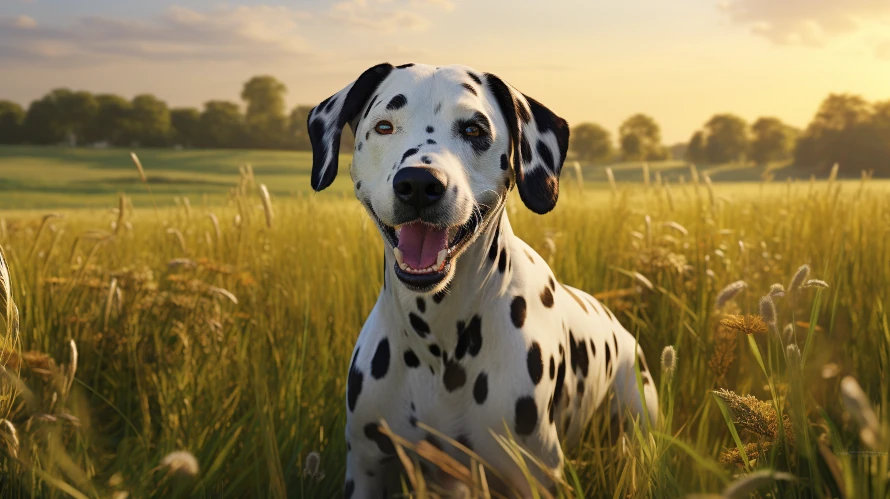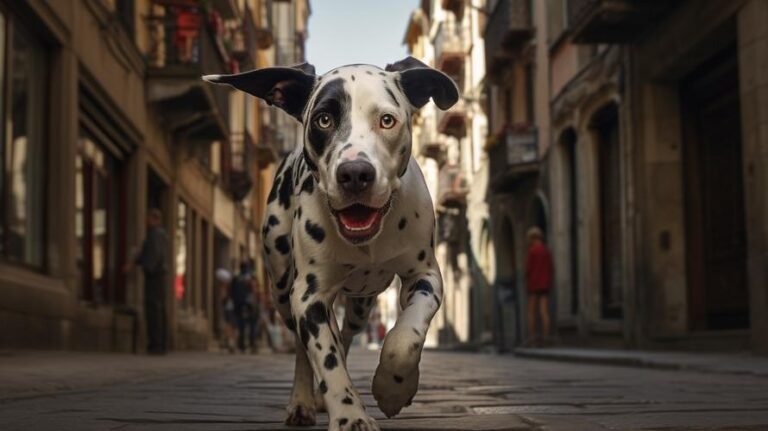Have you ever wondered why the starring dog of the movie 101 Dalmatians, Pongo, is such a charming, lovable character? Well, not all heroes wear capes, some wear spots! But is this canine character a true reflection of the Dalmatian breed or just Hollywood magic? One of the questions often asked about these enigmatic, spotted dogs is: Are Dalmatians aggressive?
Let’s embark on an intriguing journey, exploring deeply into the world of Dalmatians. Prepare to be captivated by the spellbinding tale of this breed’s personality, behaviors, and traits –some of which might entirely surprise you.
“Dalmatians are firehouse mascots!” A delightful, but little-known fact about Dalmatians is their historic relationship with firefighters. In the days when fire engines were horse-drawn, Dalmatians functioned perfectly as firehouse mascots because they got along so well with horses. They would even run alongside the carriage, barking to clear the way. So, can dogs who had such an important role in community safety truly be aggressive?
Firstly, it’s crucial to understand that dog behavior is a blend of nature and nurture, much like in humans. Some people might be born with a quick temper but, if raised in a caring environment, they can learn to control their anger. In a similar way, a dog’s behavior can depend a lot on their upbringing and environment, and Dalmatians are no exception to this rule.
Dalmatians are known for being highly energetic and intelligent dogs which, left unchecked, could potentially develop into problematic behavior. A bored or under-stimulated Dalmatian may become destructive or anxious, which can be misunderstood as “aggressiveness.” However, with proper training, socialization, and mental stimulation, these symptoms can be mitigated effectively.
Wondering how to stimulate your Dalmatian’s mind? Consider simple things like a walk in the park – a treat for the senses with all the sights, sounds, and smells – or engaging playtimes with their favorite chew toys. Mental activities such as puzzle toys or learning new tricks can also keep your Dalmatian on their toes.
Secondly, proper socialization is not to be overlooked. Dalmatians that are well socialized from a young age are likely to show aggression only under extraordinary circumstances, such as feeling under threat. Socialization involves exposing your Dalmatian to a variety of people, environments, and experiences to build a healthy, well-rounded personality.
Just like humans, every Dalmatian is unique. They have individual personalities that can range widely, even within the breed. Some Dalmatians might be a bit feisty, while others could be the biggest softies around. Pongo, for example, was smart, loyal, and loving in the movie – a true hero.
If you’re considering bringing a Dalmatian into your family, it’s worthwhile to research their origin, requirements, and personality traits, to determine if the breed matches your lifestyle and capabilities. Reputable breeders and foster caretakers can guide you with invaluable information about a potential pet’s temperament.
Additionally, it’s important to recognize that sometimes what we interpret as “aggression” might just be our furry friend’s way of communicating fear, anxiety, or discomfort. When you build a close bond with your pet, grounded on trust and respect, you can better understand their emotions and behaviors.
To sum it up, whether a Dalmatian can be aggressive largely depends on their individual personalities, and to a greater extent, their upbringing, training, and environment. Labeling any breed as categorically aggressive could be considered unfair and unjustified.
While Dalmatians have a reputation for being energetic and headstrong, these character traits, when channeled correctly, can result in a loyal, playful, and uniquely fascinating companion. Just like Pongo, your Dalmatian might end up being the hero of your real-life adventure.
So, take a closer look at that Dalmatian at your local dog park. Notice the intelligence in those bright eyes, the energy that radiates from each leap and bound. Look beyond the spots and you’ll find a loving, loyal heart that, with the right nurture, beats with nothing but love. After all, remember, not all heroes wear capes – some wear spots!



